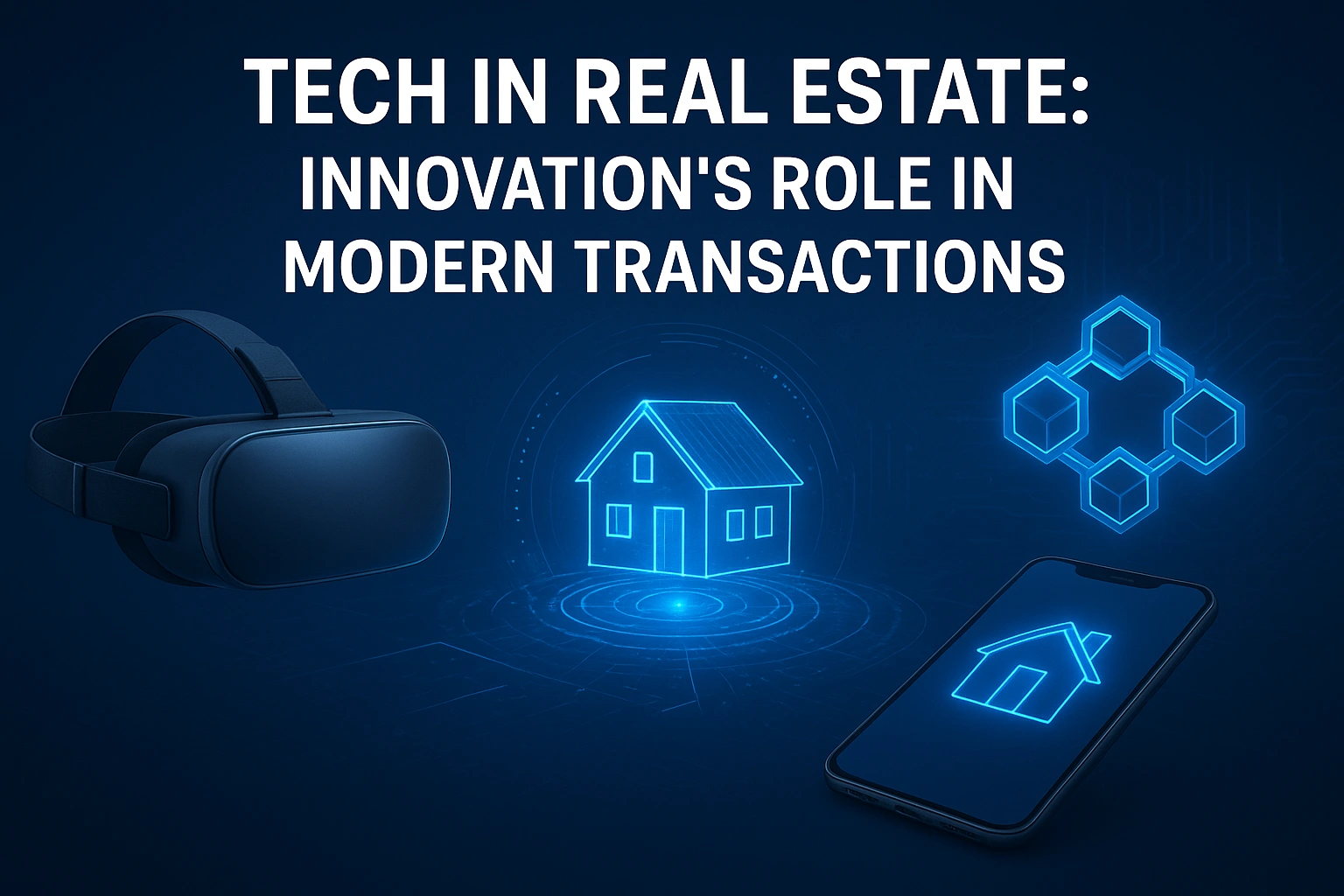The real estate industry, long considered traditional and paperwork-heavy, is undergoing a massive digital transformation. Technology has become a game-changer in how properties are bought, sold, leased, and managed. From digital property listings and virtual tours to blockchain-based smart contracts, innovation is reshaping modern transactions in ways that are faster, more secure, and highly transparent.
In the past, real estate deals often involved face-to-face meetings, endless documentation, and lengthy waiting periods. Today, much of this process has moved online, making transactions not only more efficient but also accessible to a global audience. Buyers can explore homes from thousands of miles away through immersive 3D virtual tours, while sellers can close deals securely using e-signatures and blockchain-backed contracts.
This integration of technology into real estate is not just a passing trend—it’s the future of property transactions. For buyers, it means convenience and transparency. For agents, it means better tools to market and close deals. And for investors, it opens up new opportunities in proptech (property technology), data-driven insights, and digital real estate platforms.
In this article, we’ll dive deep into the role of innovation in modern real estate transactions, explore the technologies making the biggest impact, and highlight how they are changing the way we buy, sell, and manage property.
Table of Contents

Key Innovations Driving Real Estate Transactions
1. Digital Platforms and Online Listings
- Property searches have shifted from newspapers to websites and apps.
- Platforms like Zillow, Realtor.com, MagicBricks, and 99acres provide instant access to property data.
- Buyers can filter by location, budget, amenities, and property type.
Benefits:
- Saves time for buyers and sellers.
- Wider market reach.
- Instant updates on availability and pricing.
2. Virtual and Augmented Reality (VR/AR)
- With virtual tours, buyers can experience a property remotely, simulating an in-person walkthrough from any location.
- AR apps let users visualize renovations, furniture placement, and interior design.
- Helps international investors and busy professionals evaluate properties without physical visits.
Benefits:
- Saves travel costs and time.
- Increases buyer confidence.
- Enhances marketing with immersive experiences.
3. Blockchain and Smart Contracts
- Blockchain ensures secure, transparent, and tamper-proof property records.
- Smart contracts automate transactions, reducing reliance on middlemen.
- Eliminates fraud risks and speeds up the closing process.
Benefits:
- Higher security and trust.
- Faster deal closures.
- Reduced legal disputes.
4. Artificial Intelligence (AI) and Big Data
- AI-powered platforms analyze market trends, pricing, and buyer behavior.
- Predictive analytics help investors identify high-growth areas.
- Chatbots provide 24/7 customer support for property queries.
Benefits:
- Data-driven decision-making.
- Personalized property recommendations.
- Improved customer experience.
5. E-signatures and Digital Documentation
- Contracts can now be signed electronically, making deals quicker.
- Digital ID verification ensures authenticity.
- Cloud storage simplifies access to transaction records.
Benefits:
- Paperless, eco-friendly transactions.
- Faster processing.
- Global accessibility.
6. Fintech and Digital Payments
- Integration of digital wallets, online banking, and UPI payments.
- Mortgage approvals and loan applications can be completed online.
- Fractional ownership platforms allow small investors to enter the market.
Benefits:
- Faster and safer payments.
- Inclusive investment opportunities.
- Greater financial transparency.
The Benefits of Tech-Driven Real Estate Transactions
- Speed and Efficiency → Deals close much faster.
- Cost Savings → Reduced paperwork and middlemen.
- Global Reach → Buyers and investors worldwide can participate.
- Transparency → Blockchain ensures secure, trackable records.
- Convenience → Virtual tours and digital tools simplify the process.
Challenges in Adopting Technology in Real Estate
- Data Security Risks → Cybersecurity threats remain a concern.
- Regulatory Issues → Governments are still updating laws for blockchain and e-signatures.
- High Costs for Implementation → Smaller agencies may struggle with tech adoption.
- Digital Divide → Not all buyers are tech-savvy.
Future of Real Estate Transactions
- Metaverse Real Estate → Virtual land and digital properties are gaining traction.
- AI-Powered Marketplaces → Smarter platforms that predict buyer needs.
- Decentralized Real Estate → Blockchain removing intermediaries.
- Sustainability Tech → Smart homes integrated with eco-friendly IoT devices.
For more on sustainable real estate trends, read our article on The Future of Housing: Green Buildings and Sustainable Real Estate.
Conclusion
Technology is not just reshaping real estate—it is redefining it. From blockchain-powered contracts to immersive VR tours, the innovations driving modern real estate transactions are creating a faster, more secure, and more transparent ecosystem.
As we look ahead, the role of technology in real estate will only expand, making transactions more efficient while opening new doors for investors, agents, and buyers worldwide.
For businesses and professionals in the real estate sector, embracing innovation is no longer optional—it’s essential.
FAQs
1. How is technology improving real estate transactions?
Technology speeds up processes, improves transparency, reduces fraud, and enables global participation in property markets.
2. What role does blockchain play in real estate?
Blockchain ensures secure, tamper-proof property records and enables smart contracts for faster, automated transactions.
3. Are virtual tours replacing physical property visits?
Not completely, but VR tours save time and help narrow choices before in-person visits.
4. Is digital real estate (metaverse) a real investment?
Yes, virtual land is being bought and sold, though it’s still a high-risk, emerging trend.
5. What’s the future of tech in real estate?
Expect more AI-driven insights, blockchain-based contracts, digital payments, and immersive experiences in both physical and virtual property markets.
For additional resources, visit National Association of Realtors Technology Resources.
Explore related topics:


